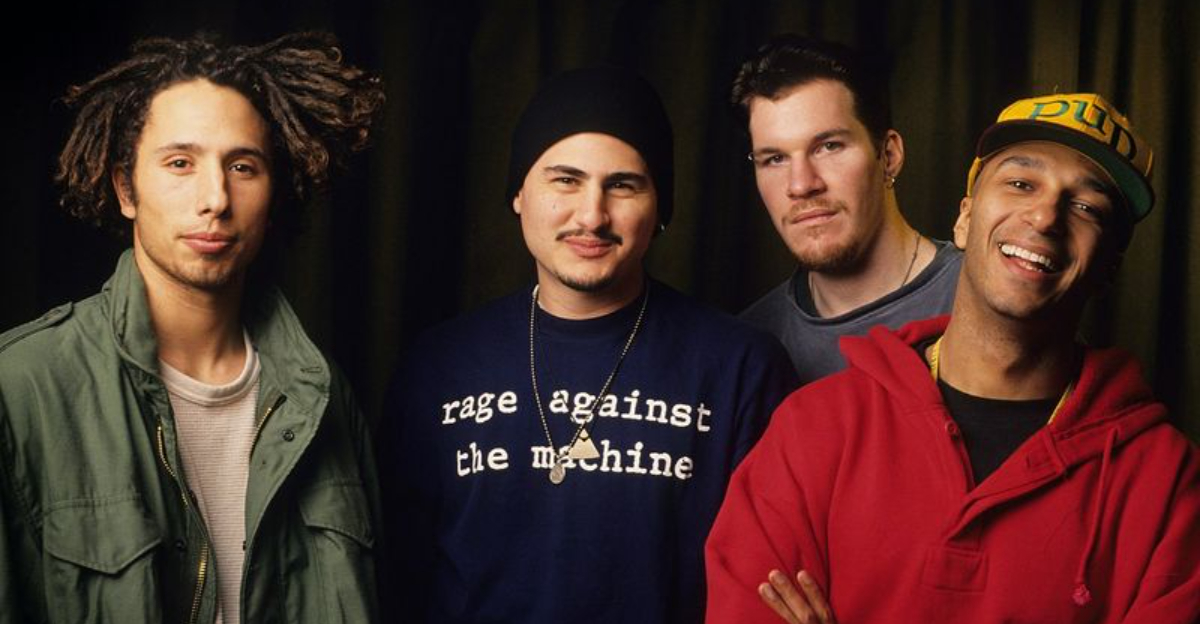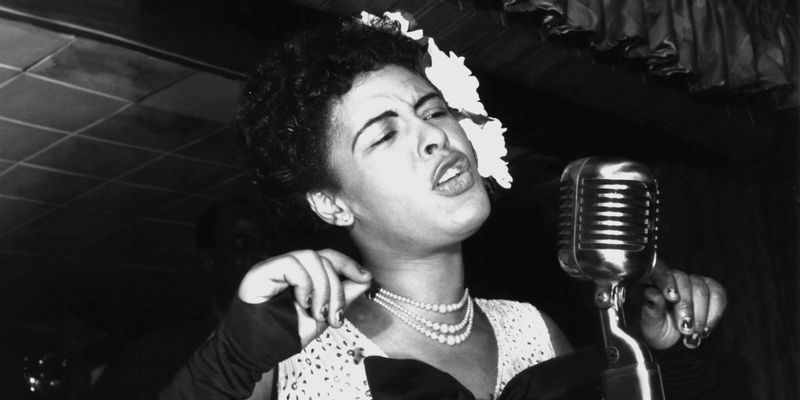Explore the intriguing stories behind 15 songs that were banned throughout history due to controversy. From protest anthems to misunderstood lyrics, these tracks have left a lasting impact on music and culture. Each song faced unique challenges that led to its censorship, yet many have since become iconic, emblematic of broader social or political movements. Discover why these songs stirred public debate and how they’ve been remembered over time.
1. “Strange Fruit” – Billie Holiday (1939)
Billie Holiday’s “Strange Fruit” is a haunting protest song about the brutal reality of lynching in America. Released in 1939, its raw emotional power led U.S. radio stations to deem it “too inflammatory.” The FBI even pressured Holiday to cease its performance. Despite this resistance, the song endured, becoming a pivotal piece in the history of protest music. Its chilling lyrics and Holiday’s poignant delivery made it an unforgettable anthem for civil rights. Today, it’s recognized not just as a song, but as a powerful statement against racial injustice. “Strange Fruit” remains an indelible part of musical history.
2. “God Save the Queen” – Sex Pistols (1977)
In 1977, the Sex Pistols shook the UK with their punk anthem “God Save the Queen.” Released during Queen Elizabeth II’s Silver Jubilee, the song’s critical tone toward the monarchy led to its ban by the BBC and numerous independent radio stations. Despite the ban, or perhaps because of it, the song soared in popularity, emblematic of the punk rock movement’s rebellious spirit. Its controversial lyrics, coupled with the band’s audacious persona, struck a chord with disillusioned youth. “God Save the Queen” remains a defining moment in punk music, remembered for challenging the status quo with unflinching defiance.
3. “Lucy in the Sky with Diamonds” – The Beatles (1967)
When The Beatles released “Lucy in the Sky with Diamonds” in 1967, it quickly became associated with the psychedelic era. However, its initials “LSD” led many to believe it was a nod to the drug, prompting the BBC to ban it. John Lennon insisted the song was inspired by his son’s drawing, not psychedelic substances. Regardless, the track’s surreal, dreamlike quality captured the essence of the 60s counterculture. Its imaginative lyrics and innovative sound remain iconic, contributing to the lasting legacy of The Beatles. Today, it’s celebrated as a classic of psychedelic rock, transcending its initial controversy.
4. “Cop Killer” – Body Count (1992)
Body Count, led by rapper Ice-T, released “Cop Killer” in 1992, igniting a firestorm of controversy. The song’s graphic depiction of violence against police sparked outrage among law enforcement and politicians, leading to protests and boycotts. Despite this, or perhaps because of it, “Cop Killer” became a flashpoint in debates about free speech in music. It highlighted the power of music as a form of protest and expression. The controversy surrounding “Cop Killer” underscored the tensions between artists and authorities, fostering discussions that continue to resonate within the music industry today. Its legacy remains influential in the realm of protest music.
5. “The Pill” – Loretta Lynn (1975)
Country icon Loretta Lynn faced significant backlash upon releasing “The Pill” in 1975. The song, which candidly discussed birth control, was rejected by many country radio stations, concerned about its impact on conservative audiences. Yet, its bold narrative resonated with women across America, symbolizing a shift towards more open discussions about women’s health and autonomy. “The Pill” became a feminist anthem, celebrated for its daring approach to taboo topics. Loretta Lynn’s fearless storytelling in the song paved the way for more artists to tackle controversial subjects, solidifying her legacy as a trailblazer in country music.
6. “Relax” – Frankie Goes to Hollywood (1983)
In 1983, Frankie Goes to Hollywood’s “Relax” became notorious for its sexually explicit lyrics. The BBC’s decision to ban the song only heightened its allure, propelling it to the top of the charts. Despite initial backlash, “Relax” became emblematic of the 1980s dance music scene. Its infectious beat and provocative content challenged societal norms, inviting listeners to embrace a more liberated approach to expression. The controversy surrounding “Relax” underscored the evolving landscape of pop music, where censorship often fueled curiosity and popularity. Today, it stands as a quintessential track of its era, remembered for breaking boundaries.
7. “A Day in the Life” – The Beatles (1967)
“A Day in the Life” by The Beatles, released in 1967, faced a ban from the BBC due to the line “I’d love to turn you on,” interpreted as promoting drug use. The song’s intricate arrangement and thought-provoking lyrics showcased The Beatles’ artistic evolution. Despite the ban, it is often celebrated as a masterpiece, reflecting the band’s ingenuity and impact on popular music. Its experimental nature and layered composition have earned it a place among the greatest songs of all time. The controversy did little to tarnish its reputation; instead, it solidified The Beatles’ legacy as pioneers of musical innovation.
8. “Killing in the Name” – Rage Against the Machine (1992)
Rage Against the Machine’s “Killing in the Name,” released in 1992, became an anthem against police brutality. Following the LA riots, its intense lyrics prompted radio censorship due to their anti-authority message. Despite this, the song resonated with audiences, fueling its status as a protest anthem. Its raw energy and uncompromising stance highlighted the band’s commitment to social justice. “Killing in the Name” remains relevant, often used in demonstrations and rallies. The song’s enduring power lies in its ability to inspire and challenge, making it a seminal piece in the landscape of politically charged music.
9. “Je T’aime… Moi Non Plus” – Serge Gainsbourg & Jane Birkin (1969)
“Je T’aime… Moi Non Plus,” by Serge Gainsbourg and Jane Birkin, released in 1969, stirred significant controversy with its overtly sexual content. Banned by the BBC, Vatican Radio, and even in Spain, the song’s explicit moaning and sensual lyrics pushed societal boundaries. Despite—or perhaps because of—the bans, it became a chart-topping success, known as the first “orgasm in a song.” Gainsbourg’s provocative artistry and willingness to challenge norms left a lasting impact on music. The song remains a daring testament to the power of artistic expression to disrupt and captivate.
10. “Puff, the Magic Dragon” – Peter, Paul and Mary (1963)
“Puff, the Magic Dragon,” released in 1963 by Peter, Paul, and Mary, faced rumors of promoting marijuana use, despite the writers’ denials. This whimsical tale of a boy and his dragon was actually inspired by a poem about lost childhood innocence. The song’s gentle melody and narrative captivated audiences, becoming a beloved children’s classic with an unexpected rebellious reputation. Its enduring charm lies in its simplicity and ability to evoke nostalgia. “Puff, the Magic Dragon” remains a testament to the imagination, inviting listeners of all ages to find magic in everyday stories.
11. “I Want Your Sex” – George Michael (1987)
George Michael’s “I Want Your Sex,” released in 1987, was a bold declaration of desire that faced censorship on MTV and radio stations during the AIDS crisis. Critics feared it promoted promiscuity, yet the song’s message was one of consensual love. Its sultry rhythm and Michael’s charismatic delivery made it a defining track of 80s pop culture. Despite controversy, “I Want Your Sex” challenged societal taboos and celebrated sexual expression. It highlighted the power of music to spark dialogue and change perceptions. The song remains a testament to Michael’s artistry and fearless approach to pop music.
12. “The Times They Are A-Changin’” – Bob Dylan (1964)
Bob Dylan’s “The Times They Are A-Changin’,” released in 1964, became an anthem for social change. Its powerful message of civil rights led to its ban in apartheid-era South Africa. The song’s poignant lyrics urged listeners to embrace transformation and justice. Dylan’s ability to capture the zeitgeist with poetic simplicity made it an enduring protest classic. It remains a symbol of the 1960s counterculture and the fight for equality. “The Times They Are A-Changin’” continues to inspire generations, underscoring the timeless resonance of Dylan’s artistry and the universal call for progress.
13. “Kim” – Eminem (2000)
Released in 2000, Eminem’s “Kim” is a raw, intense depiction of a tumultuous relationship. Its graphic portrayal of domestic violence led to bans on several radio stations, sparking debates about artistic expression and censorship. Despite—or perhaps because of—its controversy, “Kim” showcased Eminem’s storytelling prowess and willingness to explore dark, personal themes. The song’s aggressive delivery and haunting narrative remain among his most provocative works. “Kim” challenged listeners to confront uncomfortable realities, solidifying Eminem’s place as a boundary-pushing artist. It continues to be a topic of discussion in considerations of music and morality.
14. “WAP” – Cardi B ft. Megan Thee Stallion (2020)
“WAP,” released in 2020 by Cardi B and Megan Thee Stallion, became a cultural phenomenon for its explicit content. Some radio stations censored it, while conservative critics labeled it “degenerate.” Yet, “WAP” was celebrated as a feminist anthem, asserting women’s sexual agency. Its catchy beat and bold lyrics sparked widespread discussion about expression and empowerment. The song’s impact reached beyond music, influencing conversations on gender and freedom. “WAP” exemplifies the ongoing evolution of hip-hop, where artists continue to push boundaries and redefine norms. It remains a powerful statement of confidence and liberation.
15. “Hurricane” – Bob Dylan (1976)
Bob Dylan’s “Hurricane,” released in 1976, told the story of Rubin “Hurricane” Carter, a boxer wrongfully accused of murder. Its defense of Carter led Columbia Records to initially hesitate its release, fearing backlash. However, the song brought much-needed attention to Carter’s case, highlighting issues of racial injustice and judicial bias. Dylan’s storytelling prowess turned “Hurricane” into more than just a song; it was a rallying cry for truth and justice. The track’s poignant narrative and compelling delivery continue to resonate, making it a significant part of Dylan’s legacy and a powerful example of music’s role in activism.















